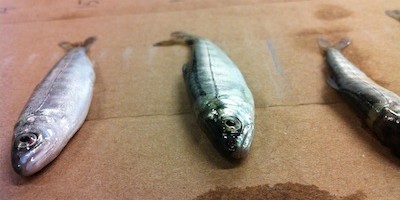
By measuring the ability of chinook salmon to tolerate heat, researchers have uncovered a link between egg size and the ability to adapt to warmer temperatures (Photo credit: Nicolas Muñoz)
Researchers have discovered a link between egg size of chinook salmon and their ability to deal with warmer temperatures.
The team captured spawning salmon and measured examined the genetic and maternal effects acting on the ability of offspring to tolerate heat; they found that mothers with larger eggs have more thermally tolerant offspring.
As egg size is known to evolve in response to environmental conditions this finding illustrates a mechanism by which salmon may adapt to warmer river temperatures coming about as a result of climate change.
Original research paper published in the Proceedings of the Royal Society B: Biological Sciences on July 8, 2014.
Names and affiliations of selected authors

